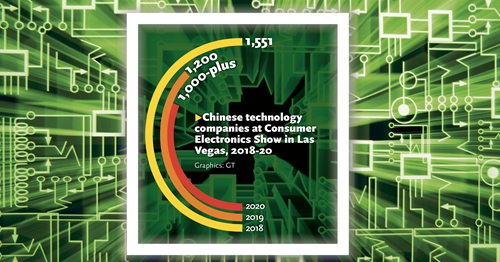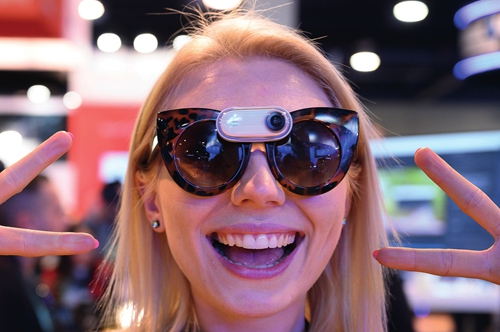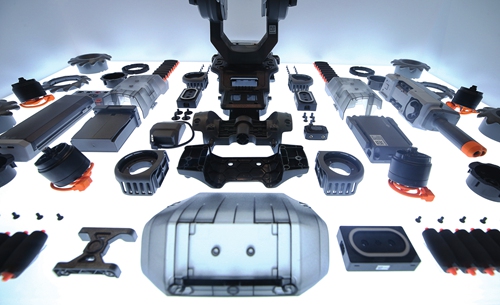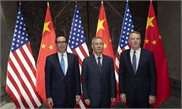SOURCE / INDUSTRIES
CES shows China-US tech decoupling ‘impossible’
Cooperation continues for now, but tensions will persist: insiders

Photo: VCG

Graphics: GT
Chinese and US technology companies on Tuesday offered a firm rebuttal to rising calls in Washington for technology decoupling between China and the US at the world's largest consumer electronics show, where jointly made high-tech products were highlighted and new cooperation deals were signed.
However, the declining participation of Chinese tech companies at the CES 2020 also underscored the tremendous impact of the US' political crackdown and the ongoing trade war on normal business cooperation among companies from the two countries. Though complete decoupling is almost impossible, tensions over technology and trade will likely persist despite a looming phase one trade deal, insiders noted.
At the CES 2020, which kicked off on Tuesday in Las Vegas, 5G technology took center stage, as many companies from smartphone manufacturers to chipmakers highlighted their latest technological breakthroughs and devices.

Insta360 representative Hannah Wilson models the company's Go camera, a tiny stabilized gadget that can be worn as a pendant or on one's eyeglasses, on Tuesday (US time) at the CES. Photo: AFP
No nationality in techBut 5G, which has been a focal point in the China-US tech rivalry, also served as an example of the inseparable nature of the link between Chinese and US tech companies. Many of the 5G devices at the CES 2020 were made with technologies or parts from both countries.
Chinese personal computer maker Lenovo launched the world's first 5G PC - the Yoga 5G - at the event, which features the Qualcomm Snapdragon 8cx processor as well as Qualcomm's X55 5G modem.
"China and the US are absolutely intertwined in the technology area and neither can separate from the other," Lenovo chairman and CEO Yang Yuanqing told the Global Times, adding that there is no nationality division in technology and technologies should serve the world as a whole.
Besides announcing cooperation with Lenovo, Qualcomm also announced cooperation with Chinese smartphone manufacturers Xiaomi and Oppo, expressing confidence in China's market.
Leon Zhang, a Qualcomm product manager, told the Global Times that for high-tech industries like 5G, it's virtually impossible to restrict technological development to a single country.
The global industry chain is continuing to expand. The US enjoys advantages in basic research in some sectors, but if it neglects China's complementary advantage in application and integration, it will in turn affect US companies, Zhang added.
Chinese telecom giant Huawei, which has been targeted by the US government in a global crackdown campaign, also appeared unfazed in face of the mounting US pressure, as it brought its technologies and devices in areas such as 5G and artificial intelligence (AI) to the CES 2020.
In a statement sent to the Global Times, Huawei said that it will continue to leverage its strengths in information and communications technologies to focus on "delivering high-quality products and a superior user experience worldwide."

Components are displayed for the DJI RoboMaster S1 Educational Robot at CES 2020 on Tuesday (US time). Photo: AFP
Lingering tensionsHowever, even as Chinese companies are eager to showcase their products and technologies in Las Vegas, the lingering tensions between the world's two biggest economic powers were also palpable at the halls of CES 2020, where many top Chinese tech companies were absent.
This year's event marks another significant drop in the number of participating Chinese companies. Slightly more than 1,000 Chinese technology companies signed up for the annual show this year, compared with about 1,200 in 2019 and 1,551 in 2018, according to media reports.
Among the most notably absent are top Chinese smartphone makers such as Oppo and Vivo, according to the directory of the event.
While many Chinese companies opted out of the event because of plenty of other platforms to showcase their products and technologies at home, others wanted to avoid headaches in getting visas for their employees and even potential harassment over legal issues.
After seeing incidents of Chinese companies targeted by legal actions over intellectual property rights at the CES before, China's Ministry of Commerce (MOFCOM), along with the Consulate-General of China in San Francisco and China Council for the Promotion of International Trade, set up a stand at the CES 2020 to offer free legal services to Chinese companies.
In a statement ahead of the event, the MOFCOM said that incidents of US companies taking emergency legal actions against Chinese companies could occur this year and urged the companies to be vigilant and prepared.
Such assessment came as Washington continues to ratchet up its crackdown on Chinese technology companies. In addition to blacklisting several Chinese technology companies, US officials have also moved to ban export of technologies and software in AI.
"The phase one deal is conducive to starting to de-escalate the trade war but tensions, particularly in technology, will continue to exist, if not escalate," Chen Fengying, a research fellow at the China Institutes of Contemporary International Relations in Beijing, told the Global Times.
"The right path for China is to prepare for the worst scenario, while pursuing cooperation."



